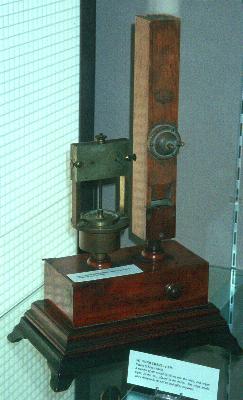| If you don't have a wind chest, the only way to demonstrate
the action of an organ pipe is to apply its lower end to your lips and
blow. This has two problems: once a pipe gets to be about 75 cm long, human
lungs have difficulty supplying the air with sufficient volume and pressure,
and it is hard to discuss the action of the organ pipe when you are blowing
it.
Wind chests have sliders, similar to those used in organs,
to open and close the air to the individual pipes. This one is in the museum
of St. Patrick's College in Maynooth, County Kildare, Ireland. It was sold
by Yeates and Son of Dublin ca. 1875, and was made by Rudoph
Koenig of Paris.
Mounted on the wind chest are a siren
and an organ pipe with a manometric
flame.
Return to Acoustics Home Page
| Return to Home Page
|
 |